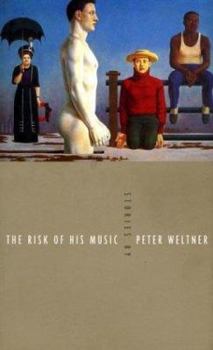The Risk of His Music
With an emotional reach that extends from the incidental to the incendiary moments in our lives,The Risk of His Musiccaptures a world that is, as theAdvocatesaid about one of Weltner's previous works,... This description may be from another edition of this product.
Format:Paperback
Language:English
ISBN:1555972535
ISBN13:9781555972530
Release Date:February 1997
Publisher:Graywolf Press
Length:249 Pages
Weight:0.75 lbs.
Dimensions:0.7" x 5.3" x 8.5"
Customer Reviews
2 ratings
Jacket Blurbs
Published by Thriftbooks.com User , 15 years ago
Peter Weltner's stories are about the art of inhabiting one's body, of the death and resurrection inherent in learning and failing to learn that art. Forrest Gander Weltner portrays vividly his charcaters: gay vets of Vietnam, Southern hayseeds sprouted in all the wrong hometown settings, and, perhaps most interestingly, male lovers who've lived and aged together long enough to witness the general decline of things in the middle America where they've chosen to live, and who must then finally, as do any 'married couple,' see each other through to burial at the bitter end. Edmund White These are generous, wise, and lyrical stories, beautifully written, full of the big music of life and death. Molly Giles
AN UNDERAPPRECIATED WRITER
Published by Thriftbooks.com User , 24 years ago
With his fourth book, Peter Weltner offers many perfectly pitched moments that capture gay characters who range from teenage to old age. In "My Faithful, Faithless Friend," Weltner has two boyfriends playing a clever, childlike driving game, trying to top each other at precisely naming the colors of passing cars: "Toasted almond." says Todd. "Maybe." says Jay. "More like butterscotch."As well as he captures such youthful whimsy, Weltner can convey a more mature perspective. In "The Greek Head," a man in his sixties whose lover has just died, offers angry and essential advice to his uneccesarily restless thirtysomething neighbors, seemingly poised for a break-up: "We made it work," he argues. "Is my message clear? "It just makes you all so angry, thinking you can't have everything and everyone, because you can't. You never could. It's such an elementary truth.""The Greek Head" also boasts a craftily twisted surprise near its end. It's a nuance-rich revelation worthy of O. Henry, packing a real storytelling wallop, the likes of which are rarely found in the moody open-endedness of most contemporary gay short fiction. "Hearing Voices", the book's third piece, is stunning; reason enough to own the book. San Franciscans Kevin and Joe attune their ears to the inevitable creaks of their long, steady and truly loving relationship while, next door, AIDS roars at their neighbors, Jerry and Jorge. A mysterious phone caller- who Weltner renders hauntingly sensual rather than obscene -begins drawing Kevin into a web of sexual fantasy as fraught with guilt as it is with release. That conscientious ache of guilt, which arises in story after story here, is one of the consistent glories of Weltner's work. The author's voice is that of a responsible, romantic grown-up, not another self-protectively cynical, post-modern gayboy writer. Weltner is at his most gamesome in the collection's final story, "Unlike Himself". After all of Weltner's subtle etching of realistic subject matter, here's what, at first, appears to be a gothic body-switching story. Uptight, repressed academic Arthur Loudermilk and handsome, arrogant hustler Brice Landry supernaturally swap bods in a New Orleans hotel room. Weltner's wrinkle is that each of these self-absorbed and self-loathing little gargoyles ultimately come to realize that it's just as troublesome living with his own mind and body as it is to live with the other guy's. Initially surprising in its nod toward old-fashioned horror yarns, "Unlike Himself" is really quite like all of Weltner's strong work. It blends sturdy literary traditions with bracingly contemporary situations and psychology.






